JUDAH
BENJAMIN: THE BIG JEW OF THE CONFEDERACY
Mike King
Benjamin's influence was immense.
Why has he been all
but erased from history?
"Judah
P. Benjamin was known as "the
brains of the Confederacy," its "court Jew," "the
statesman of the Lost Cause," and even "the
Confederate Kissinger. As, successively, Attorney
General, Secretary of War and Secretary of State in the Confederate
Cabinet,
he was President Jefferson Davis' closest and most trusted adviser."
- The New Orleans Times Picayunne / 'The Confederate Kissinger'
/ April 20, 2010
Based on Excerpts from Planet Rothchild / Volume 1
When
we think of the Confederacy, the big names that automatically come to
mind are the three legends
carved into the side of Georgia's Stone Mountain: President
Jefferson Davis, General Robert E. Lee and General Stonewall Jackson.
Significant figures for sure, but in the grander power-scheme
of things, these men, including President Davis himself, were
outranked by Judah P. Benjamin. The fact that Benjamin's name is so relatively unknown is, ironically, testament
to the awesome "behind-the-scenes" power that he wielded. Unfortunately for the South (and the North), Benjamin's
influence served neither of the Americas. His loyalties lay elsewhere - in Rothschild's London!



Benjamin's image never made it to Stone Mountain, but his 'mug-shot'
did appear on Confederate currency and bonds!
Before and during the War Between the States, there is Jewish influence supporting both the
cause of Northern Unionism and Southern Secession. Louisiana Senator John Slidell
is not Jewish (at least not outwardly), but his family ties to elite European Jewry runs deep. Slidell’s daughter
is engaged to Baron Frederic Erlanger, a French Jewish financier based in Paris. Erlanger helps to fund the
Confederacy, gouging the South with usurious interest rates and fees too! (here)
Erlanger's financing of the South, as confirmed even by
today’s New York Times , is directly linked to the House of Rothschild.
(here) Pappa-in-Law Slidell would later serve the Confederate States government as foreign diplomat
to Great Britain and French Emperor Napoleon III.
Now the niece of the influential Senator is married to northern financier
August Belmont (Schönberg)- Rothschild’s Jewish boy and Democrat boss supporting the
Northern cause, at least at first. After the war, “Confederate”
Slidell will make his “Unionist” nephew-in-law Belmont his political protégé.
Also hooked up with Senator Slidell in this tangled North-South-Rothschild knot of financial-political intrigue
is fellow Louisiana Senator Judah Benjamin,
the Jewish big-shot who goes on to become the Confederacy’s
Attorney General, then Secretary of War, and then Secretary of
State. Through the shadowy fog of 150 years of elapsed
history, we can now discern a pattern of divide & conquer,
balance of power conspiratorial actions being played upon
both sides - and with tragic consequences.

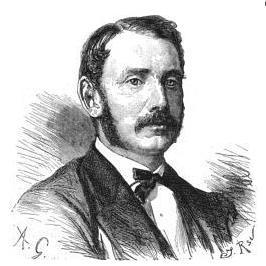


Senator Slidell – His Jewish Son-in-Law Erlanger – His Jewish Northern Nephew-in-Law
Belmont, and Jewish fellow Senator Benjamin form an incestuous North-South connection with direct links to
the House of Rothschild.
BATTLE OF BULL RUN / SOUTH WINS; BUT FAILS TO FOLLOW-UP WITH ‘KNOCK-OUT BLOW'
If the South is to have any chance of gaining independence, it will have to win early,
before the more industrialized and populated North can outlast them. The first battle of the war at Bull Run (Manassas,
Virginia) is therefore critical. To make a long story short, the rebels force a Union retreat that soon turns into a
full rout. The Battle of Bull Run will soon be referred to by some as “The Battle of Yankee Run".
The
Union Capital, Washington DC, is just miles away and now essentially
undefended. It is the South’s for the taking. The capture of DC
and other parts north would have delivered a huge psychological
blow to the North. Because many northerners aren’t in favor of
the war anyway; the capture of DC might very well have
ended the war that same year. But instead of finishing the job,
someone has decided to spare the Capital - a decision that
inflames the Southern press and leads to bitter
finger-pointing.
The ‘fall-guy’ for this blunder will be War Secretary Leroy Walker.
But
in reality, it is the ex-war hero, ex-War Secretary and current
Confederate President Jefferson Davis who calls the shots,
not the young Walker. But it is also known that Davis relies
heavily on the advice from the man whose intelligence and gift-of-gab
he is awed by – Jewish Attorney General and former Louisiana
Senator Judah Benjamin, referred to by critics as, “Davis’s pet Jew”. (here)
Was it Judah Benjamin, the man so admired by Solomon de Rothschild, (here)
who may have whispered poison in Davis’s ear, telling him not to take
DC and thus blowing the chance to win the game
early for the South? And after Walker has been made the
scapegoat and fired; who replaces him as War Secretary? None other
than Judah Benjamin!
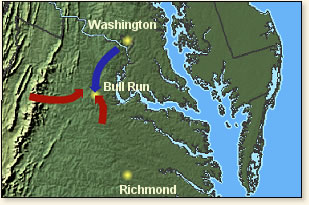

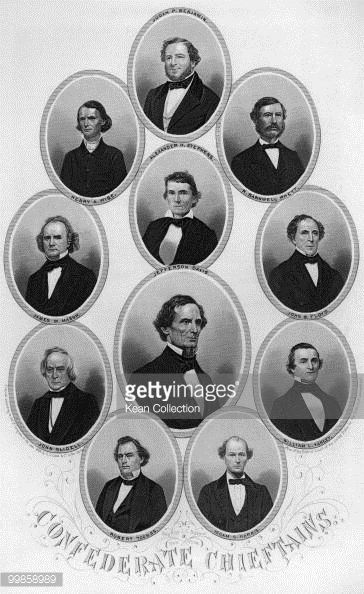
1 & 2 - After Bull Run turned into a rout, Washington DC –
just 30 miles away – could have been captured. Whose idea was it to halt? That of Davis -- or his
trusted "adviser" Benjamin?
3
- Engraved portraits (from 1861) of the South's chieftains
depict Judah Benjamin at the very top (!) with Jefferson Davis
in a bigger circle but down lower. Sleazy Slidell with the
Rothschild agents for in-laws is to the left of Davis.
Could
the new War Secretary Benjamin's subsequent 1861 interference with the Generals, - acts so controversial that
they would force a Congressional investigation - and his bizarre refusal to supply them as requested have been a
ploy designed to prolong the war until Rothschild could bury both sides in debt, before sending the Family's British
and French hit-men to divvy up' America into two spheres?
Establishment
historians will later
claim that Benjamin's stubborn defiance of the Generals was due
to a lack of supplies in the South. But given how early it
was in the war, the claim that supplies were low seems like a
cover story. If "lack of supplies" had been the
cause of Benjamin's decisions, Generals Stonewall Jackson and
P. G. T. Beauregard would not have had reason to dislike Benjamin
as they did.
Such a delaying scenario would fit perfectly with a Rothschild plan to have
a long war, one in which both sides could be indebted and weakened before the British & French can arrive.
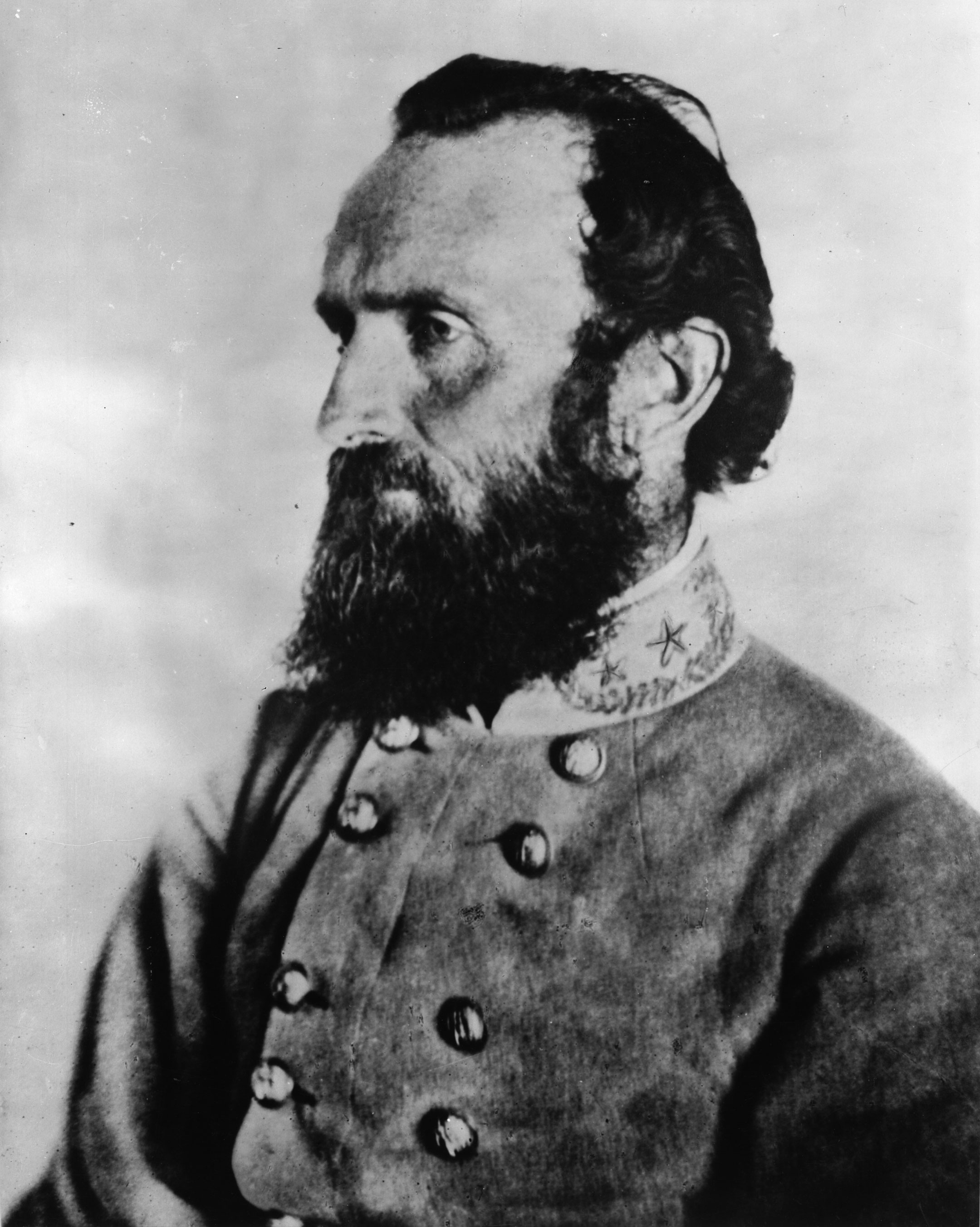

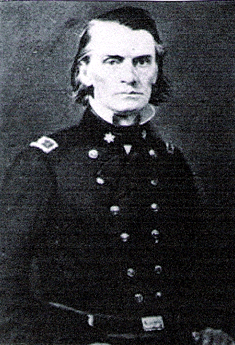
Generals
Jackson, Beauregard and Wise all hated Judah Benjamin.
That
in mind, let’ take a closer look at the shady Mr. Benjamin. Outwardly, the esteemed Jefferson
Davis is the ‘top dog’ of the South – the President of
the Confederate States of America.
But behind the scenes, Judah Benjamin, with his European
connections, 'gift of gab' and impressive intellect is, in the grand
scheme of things, more powerful than Davis. What the banking
agent Alexander Hamilton had been to George Washington, the trusted
Benjamin is to Davis, and then some. Like Hamilton, Benjamin was also born a British subject (West Indies).
There is simply no exaggerating the influence of Judah Benjamin.
Biographer Eli Evans wrote that Benjamin:
"...achieved greater political power than any other Jew in the nineteenth century
— perhaps even in all American history."
Historian Charles Curran, in a 1967 issue of ‘History Today" wrote:
"Judah Philip Benjamin must
be bracketed with Disraeli, who was his contemporary,
as the ablest Jewish politician ever born under the British
flag. But his career outdid Disraeli’s in audacity. Benjamin
lived three lives in one."
Judah
is a plantation owner,
slave-owner and originally a Senator from Louisiana - as was
the aforementioned and equally European-connected John Slidell.
Although he has no military experience, Benjamin is named the South’s Secretary of War in 1861, after
having served as Attorney General for several months. Many in the South will come to loath and mistrust Benjamin. The
great General Jackson once threatened to resign over conflicts with Benjamin (here) - who was commonly referred to in the South as “Mr.
Davis’s pet Jew". (here)
But certain people in Europe had a much higher opinion
of Benjamin. In 1861, Salomon de Rothschild - grandson of dynasty founder Mayer Amschel Rothschild
- during a visit to Louisiana describes Benjamin as: “the greatest mind in North America” (here) That pretty much tells us all we need to know about the “southern rebel” Judah Benjamin!
In
the fall of 1859, de Rothschild, the son of Baron James de
Rothschild of Paris, had come to the United States as a
tourist. His travels in the North and South are recorded in a series
of letters to his cousin Nathaniel in London.
Rothschild
met with prominent politicians (surely with Benjamin!) and commented on the issues of the day. His views were
"pro-Confederate" and his letters urged cousin Nathan to use the family's influence to gain the recognition of the
Confederacy by the European powers.

Rothschilds for Dixie? - Sing it! - "Oh I wish
I were in the land of Matzo..."
Solomon Rothschild (l) urged Nathan Rothschild (who resembles Judah Benjamin) to support the South.
EXCERPT: "The European states should indeed intercede in order to avoid bloodshed which would be useless
and very detrimental to their commerce.....
What
is astonishing here, or rather, what is not astonishing, is the high
position occupied
by our co-religionists, or rather by those who were born into
the faith and who, having married Christian women, and without
converting, have forgotten the practices of their fathers.
Judah P. Benjamin, the Attorney General of the Confederate States, is
perhaps the greatest mind on this continent. H.M. Hyams, the lieutenant governor of Louisiana, Moyse, the
Secretary of the Interior, etc. And what is odd, all these men have a Jewish heart and take an interest in me,
because I represent the greatest Jewish house in the world." (here)
http://www.jewish-history.com/salomon/
JUDAH
BENJAMIN's EUROPEAN PLOT
In
1862, Benjamin, under
intense Congressional pressure, is forced to resign as War
Secretary. Jefferson Davis then appoints his beleaguered adviser
as the South’s Secretary of State! In this position, Benjamin
will work with Slidell and Slidell’s French Jewish
son-in-Law Erlanger to secure not just financing from the
Rothschild syndicate, but also to induce the direct involvement
of Rothschild’s Britain & France into the war, on the side
of the South.
A joint British & French entry into the war would have tipped the scales in favor of the South,
and ultimately led to two American nations, both under foreign influence. Lincoln and his Secretary of State, William
Seward block Judah Benjamin's scheme by turning to Russia for help.
In
a clear message to his old Rothschild-funded foes from the Crimean War,
Czar Alexander II stations
the better part of his Pacific fleet in San Francisco, and a
portion of his western fleet in New York. The British & French
instigators of the Crimean War get the message and are forced
to back off. Judah Benjamin and the Rothschild financiers are
thus thwarted. Together, Alex and Abe have defied the London Bankers and will both pay a heavy price
for it.
After the war, in recognition of, or payback
for, Russia’s help in keeping Britain & France out of the war; Seward will arrange for the purchase of Alaska
from Russia after the war – an act dismissed at the time as “Seward’s Folly”. But now we know the
reason for the “folly".


1-
The presence of Russian fleets in San Francisco and New York
kept Judah Benjamin's British and French attack dogs at bay.
2- Seward's Folly was Union payback to Russia.
OCTOBER, 1864
THE
CHICAGO TRIBUNE ACCUSES AUGUST BELMONT AND THE ROTHSCHILDS OF PLOTTING AGAINST THE UNION
On 16, October 1864 on page 2, The Chicago Tribune reported,
BELMONT'S CONFEDERATE BONDS (Excerpt)
"It
is perhaps
somewhat flattering to our national pride to know that
the Rothschilds, who hold up every despotism in Europe, have
concluded that it would be cheaper to buy up one of
our political parties (Democrats), and in that way secure the
dissolution of the Union, than to have their agents in
England and France interfere and fight us.
But
Irishmen and Germans
have a something, which for brevity we will all a
'crop,' and this fact sticks in their crop, that the oppressors
of Ireland and Germany, the money kings of Europe, not
daring to carry out their first pet project of breaking down
this Government by the armed intervention, of England
and France.
Let
Belmont state over his own signature, if he can that he and
Rothschilds have not, directly
or indirectly, in their own name, or in that of
others, operated in Confederate stocks during this rebellion. Until
he can face the music in that style it matters little
what tune any of the Copperhead penny whistles may be authorized
to blow, as they are very seldom authorized to state
anything that is true."




ALL CONNECTED!
Slidell – Erlanger – Belmont – Benjamin
DID JUDAH BENJAMIN KILL LINCOLN?
In the closing days of the American Civil War, a massive conspiracy to decapitate
the U.S. government results in the assassination of President Lincoln by an actor with ties to secret societies. John
Wilkes Booth shoots Lincoln in the back of the head as Lincoln and his wife watch a play at Ford’s Theatre.
Booth escapes.
On the same night of Lincoln’s murder, Lewis Powell, an associate
of Booth, attacks Secretary of State William Seward
in his home. Seward is stabbed in the face and neck before
other men in the house subdue Powell. Seward’s wife Frances
dies two months later from stress caused by seeing her husband
nearly killed.
Vice President Johnson and General Ulysses
S Grant were also to have been killed. The “conspiracy theorists” of the day point the finger at Judah
Benjamin, (here) who burns the official papers of the Confederate Secret Service right about this time. (here) Thanks to Bennie the Burner, the full story of Confederate clandestine services, and
most likely the Lincoln assassination, may never be known.


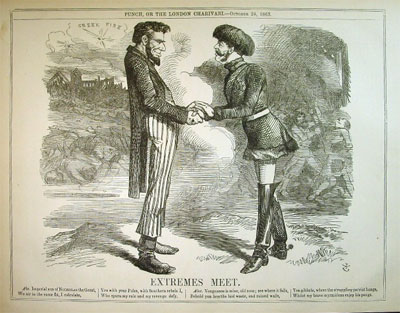
1 & 2: Abe and Alex both paid with
their lives for defying the Rothschilds. Judah Benjamin was suspected of engineering the Lincoln assassination.
3 - "Extremes
Meet" - British Press mocks Abe and Alexander's cooperation.
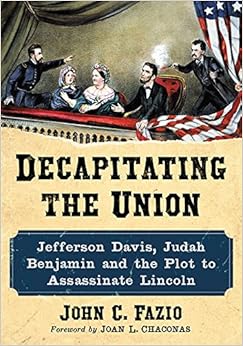


Lincoln's
alliance with the Rothschild family's most hated enemy, Russia,
and his printing of interest-free 'Greenbacks" to finance
the war were big "no-no's" that got him killed. John Fazio's
'Decapitating the Union' supports the belief of many
during that time that Judah Benjamin was the mastermind of the
plot.
BENJAMIN BUGS
OUT
As
the south collapses, Benjamin
stays in the home of a Jewish merchant in South Carolina while
final surrender negotiations drag on. Here, Benjamin abandons
President Davis's plan to fight on, telling him that the cause
is hopeless. When negotiations fail, Benjamin remains
part of the group around Davis that moves on with the
President.
At one point, Benjamin (under suspicion for involvement in Lincoln’s assassination)
tells Davis that he needs to separate from the Presidential
party temporarily, and go to the Bahamas to be able to send instructions
to foreign agents. He reassures Davis that he will rejoin him
in Texas. According to historian William C. Davis, "the
pragmatic Secretary of State almost certainly never had any intention of returning to the South once gone".
(here)
When he bades
Postmaster Reagan goodbye, the Postmaster asks where Benjamin is going. Benjamin replies: "To the farthest place from the United States, if it takes me to the middle of China." (here)
While
other
Confederate leaders, including the trusting fool Jefferson
Davis, are being jailed and abused, Benjamin arrives in London
before traveling to Paris - where his wife and daughter had
been sent to live years before the war had even started.
Benjamin then moves back to England and will enjoy a very
profitable career and “second life” as an attorney,
until his death in 1884. Congressman John Wise, son of
Confederate General and Virginia Governor Henry Wise, wrote a highly
popular book about the South in the Civil War in 1899, The End of an Era. In it, he stated:
"(Benjamin)
had more brains and less heart than any other civic
leader in the South ... The Confederacy and its collapse were
no more to Judah P. Benjamin than last year's bird's nest."
(here)
Unfortunately for
historians, and fortunately for the Rothschilds, Benjamin, exactly as
he had done with papers pertaining to the Confederacy’s secret
services in 1865, also burned his personal papers shortly
before his death in 1884.
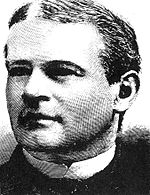


1 & 2 - John Wise's ‘End of an Era’
expresses the true Southern feeling toward the fleeing scoundrel Judah Benjamin, to whom the South was like "last
year's bird's nest."
3 - After abandoning his Confederate colleagues and the people of the South, Benjamin the "British"
Barrister went on to enjoy a hugely successful 2nd career in Rothschild’s London -- where he was a contemporary of Karl
Marx and Benjamin Disraeli.
Now that you know the story of "The Confederate Kissinger"; the reason his name
is so little known should no longer be a mystery.
